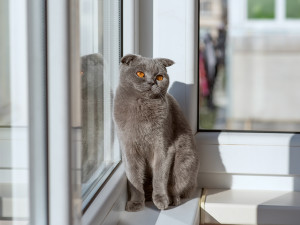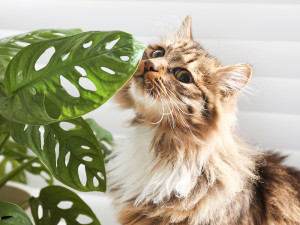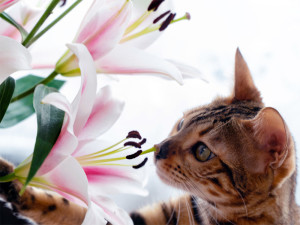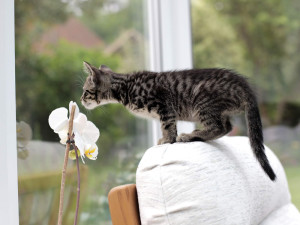Why Is My Cat Throwing Up Undigested Food?
And how you can prevent it.

Share Article
In This Article:
What Does It Mean When Cats Vomit Undigested Food? What Causes Vomiting of Undigested Food In Cats? What Should You Do If Your Cat Is Vomiting Undigested Food? Treatment of Vomiting In Cats How to Prevent Vomiting in Cats
Nothing initiates you into cat parenthood quite like the tell-tale gagging and retching associated with vomiting. Whether it wakes you in the middle of the night or happens soon after eating, vomiting is an unwelcome experience no matter the circumstances.
However, it can be very confusing if your cat is vomiting undigested food. Why does this happen? We’ll get to that and what you can do to help your cat who’s throwing up undigested food.
What does it mean when cats vomit undigested food?
Vomiting in general is fairly common in cats, so, as a cat parent, you’re likely to experience it at some point. However, it’s important to know the difference between vomiting and regurgitation.

Vomiting is the body’s way of getting rid of something irritating; it’s what happens when the contents of the stomach and initial portion of the small intestine are forcefully removed from the body. Food may be undigested if it’s soon after eating, or it may be partially digested if the issue happens later on. Vomiting usually starts with some nausea and requires full-body heaving.
Regurgitation is closely related to vomiting, but it occurs when the contents of the mouth and esophagus are forced back up. This usually happens without the fanfare of vomiting, requiring little effort from your cat to produce a log of undigested food.
So, why does this matter so much? Knowing which one your cat is doing will help you determine the cause as vomiting has different underlying conditions than regurgitation. But when a cat is doing either one, it usually points to something going on with the digestive tract, or in some cases, more of a whole-body illness.
What causes vomiting of undigested food in cats?
There are few reasons cats may vomit undigested food, including:
Eating too quickly
Cats may not have the reputation of gobbling their food that most dogs do, but some of them can definitely get after it. Cats who inhale their food rather than savor it may vomit shortly after eating because their stomach is forced to stretch too quickly, something it doesn’t like to do. Gobbling can also cause a lot of air to be swallowed along with the food, prematurely filling the stomach. If their stomach gets too full too quickly, a cat may regurgitate the food that won’t fit.
Diet sensitivity or allergies
Most cats are known for having a persnickety personality, often meaning they like things, including their food, just so. But some cats actually need to be a little choosy about their diet because they have food allergies or sensitivities to certain ingredients. While most cats with food allergies develop issues with protein sources, such as beef, chicken, or eggs, some can have issues with grains or dairy. The irritation of the offending ingredient can cause vomiting soon after eating meaning they throw up some undigested food.
Digestive issues
Because vomiting deals with removing something from the digestive tract, it would make sense that anything disrupting that system could lead to vomiting undigested food. Things like inflammation from pancreatitis, inflammatory bowel disease or gastritis, infections, or obstructions may be behind your cat’s vomiting. These things can not only cause irritation that’s capable of causing vomiting, but they can also slow the process of digestion, so that vomit that comes up may include undigested food.
Hairballs
Your cat works hard to look their best, which includes hours spent slicking their hair coat and removing shed hair. Their tongue is specially equipped to move that loose hair down their throat to be disposed of with other waste products in the feces. But sometimes it can be overwhelming and instead of moving through without interruption, hair can accumulate in the stomach or small intestine where it isn’t welcome. Cats may gag, hack, or retch to get the excess hair out, sometimes bringing undigested food with it.
Underlying medical conditions
Every system in the body is connected, so an illness that affects one part can easily cause problems in another. Diseases such as kidney failure, diabetes, hyperthyroidism, cancer and more may be behind your cat vomiting undigested food. Look for other symptoms such as weight loss, a change in appetite, or increased water consumption as well.
What should you do if your cat is vomiting undigested food?
Vomiting is so common in cats that the occasional episode here and there usually isn’t a big deal. You’ll want to monitor them for other signs such as lethargy, not eating, diarrhea, stomach pain, weight loss, or increased water consumption.
Your response should change, however, if their vomiting undigested food is taken to a new level. Frequent vomiting, such as more than once in 24 hours, or intermittent vomiting lasting longer than a week or two should see a veterinarian. You’ll also want to seek professional care if your cat’s vomiting is accompanied by other signs.
Treatment of vomiting in cats
Your vet will start by determining the underlying cause of your cat’s vomiting. This may take an exam, along with bloodwork, or imaging to diagnose. An endoscopy may be helpful in some cases as well.
Treatment may consist of medications and supportive care for causes such as infections and whole-body illnesses. Cats with food allergies and some digestive issues may also benefit from a diet change to a limited-ingredient or novel protein food.
Surgery to remove a hairball or foreign object may also be necessary.
How to prevent vomiting in cats
You’re not going to be able to prevent vomiting undigested food in every case, but there are some steps that can be done at home. Start by slowing down your cat’s eating. Feed smaller meals or use a slow feeder or puzzle feeder to encourage your cat to taste their food a bit more.
Cats who are prone to hairballs may benefit from a change in diet or the addition of a hairball supplement that will help move the hair through.
Keeping your cat healthy is very important. Schedule regular veterinary visits, use preventative medicine, such as vaccinations, and monitor them for any changes in behavior. You’ll also want to make sure they have access to fresh, clean water at all times and that they are getting enough exercise.
Bottom line
Vomiting is a common issue in cats. That includes throwing up undigested food.
There are many causes of vomiting undigested food ranging from eating too quickly to whole-body illness such as hyperthyroidism.
See your veterinarian if your cat throw up undigested food frequently or intermittently for longer than a day or two.
References
Lundgren, Becky DVM. “Vomiting or Regurgitation in Dogs and Cats.” Veterinary Partner. 19 Dec 2019. https://veterinarypartner.vin.com/default.aspx?pid=19239&id=4952781opens in new tab.
Williams, Krista, BSc, DVM; and Ernest Ward, DVM. “Vomiting in Cats.” VCA Animal Hospitals. https://vcahospitals.com/know-your-pet/vomiting-in-catsopens in new tab.

Dr. Chyrle Bonk, DVM
Dr. Chyrle Bonk has been a mixed-animal veterinarian since 2010, with a special interest in rehabilitation. When she's not practicing or writing about veterinary medicine, you may find her exploring the outdoors with her family or tending to her cows, horses, chickens, or cats and dogs.
Related articles
![cat sniffing a plant]()
Household Plants That Are Toxic to Cats
These plants might be beautiful, but they’re deadly to feline foragers.
Are Carnations Toxic to Cats?
If you receive this flower in a bouquet, keep it away from your cat.
![Cute Bengal cat sniffs lilly flowers.]()
Are Lilies Toxic to Cats?
This holiday weekend, keep those Easter lilies far away from your kitty.
Are Poinsettias Toxic to My Cat?
Maybe skip this holiday decoration if you’ve got a cat in the house—here’s why.
![Half-bengal kitten indoors smelling white orchid flowers in a conservatory.]()
Are Orchids Toxic to Cats?
Find out whether you can get that elaborate flower arrangement—or if you should skip it.
What Flowers Are Toxic to Cats?
Find out what you can and can’t plant in your garden.







